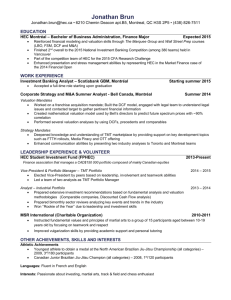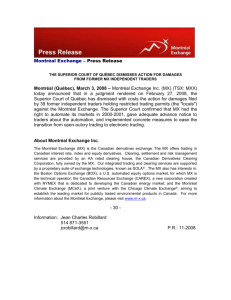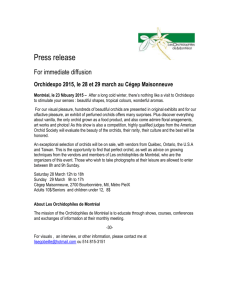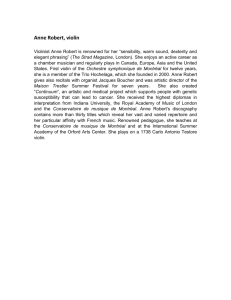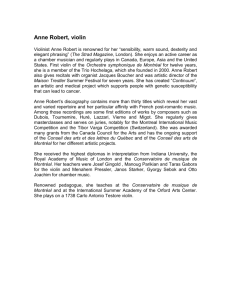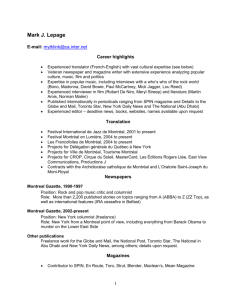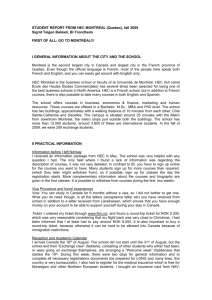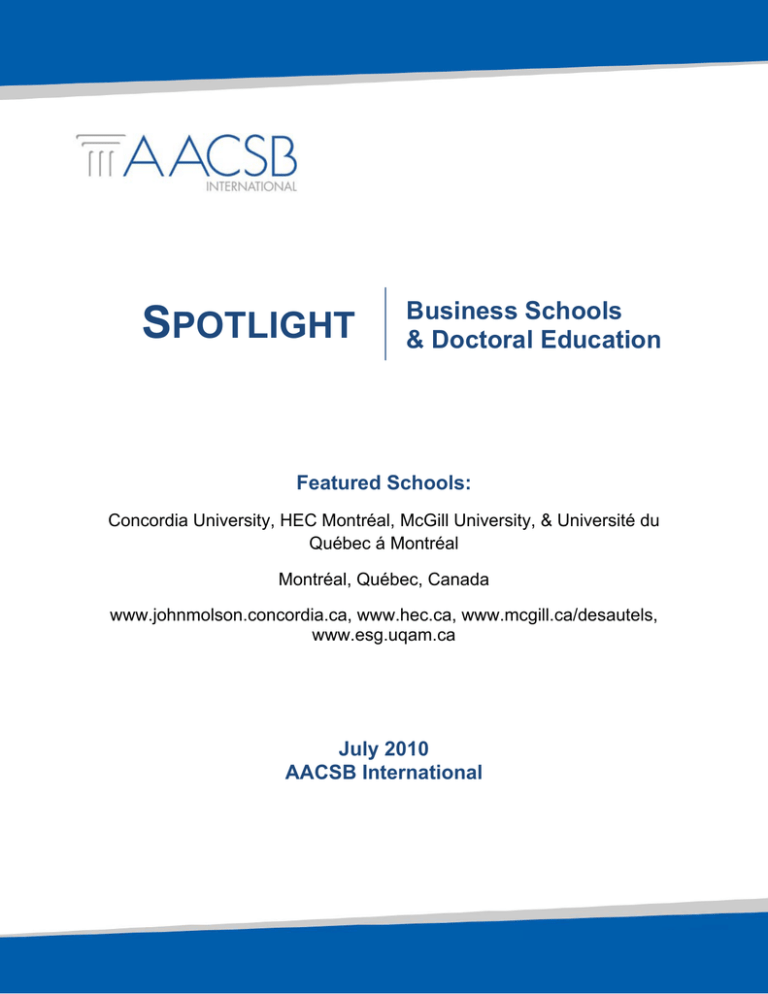
SPOTLIGHT
Business Schools
& Doctoral Education
Featured Schools:
Concordia University, HEC Montréal, McGill University, & Université du
Québec á Montréal
Montréal, Québec, Canada
www.johnmolson.concordia.ca, www.hec.ca, www.mcgill.ca/desautels,
www.esg.uqam.ca
July 2010
AACSB International
SPOTLIGHT | Business Schools & Doctoral Education
The Montréal Joint Doctoral Program | 2
The Montréal Joint Doctoral Program
In 1976, four university business schools in Montréal, Québec, embarked on a new strategy for delivering
their business doctoral programs. For the past 34 years, Concordia University’s John Molson School of
Business, HEC Montréal (affiliated with the Université de Montréal), McGill University’s Desautels Faculty
of Management, and the School of Management (ESG) of the Université du Québec à Montréal (UQAM),
have combined their educational efforts to deliver the Montréal Joint Doctoral Program, a collaborative
PhD in business administration that is more expansive and flexible than any one of the participating
schools could offer alone.
According to Dr. François Bellavance, outgoing director of the PhD program at HEC Montréal, the
cooperative nature of the program has substantial advantages for both the business schools and their
students. Because doctoral programs are expensive to run, require a critical mass of sustained faculty
involvement and expertise, and generally have far fewer applicants than the less rigorous programs of the
undergraduate and master’s levels, they can be difficult for any one school to support. Since the
collaborating universities combine their course offerings and make them available to doctoral students
across all four schools, the students are able to take advantage of a much larger pool of faculty expertise,
as well as a wider array of available disciplinary specialties and linguistic opportunities.
Between the offerings of the four schools, students are able to specialize in a large variety of fields,
including but not limited to: accounting, applied economics, finance, general management, HRM,
international business, marketing, MIS, operations/logistics management, organizational behavior,
quantitative methods, and strategy. At the same time, the faculty of the four business schools are able to
reach out to a significantly larger number of PhD candidates than any single one of the participating
schools would attract by itself.
The structure and requirements of the program are largely the same across all four schools, though each
graduating student receives the PhD degree awarded by his/her home institution. Because each school
has a vested interest in the candidates of the joint program, students are required to form committees of
at least three members, including at least one that must come from a school other than the student’s
home institution. The primary supervisor must be from the student’s home institution, however. According
to Dr. Bellavance, the members of this committee may change from one phase of the program to the
next, but the proportional representation remains the same.
While each school’s program makes allowances for a preliminary phase of non-credit-bearing
foundational business courses, primarily for candidates with an academic background in disciplines other
than business, there are two primary phases of the Montréal Joint Doctoral Program. In the first of these
phases, students take two required seminars, one each in pedagogical and research methodology, as
well as four to five seminars in their chosen field of specialization. Each of the four schools offers at least
one seminar that counts toward the two required core seminars, and frequently more than one, especially
for the required seminar in research methodology. The pedagogical core seminar is sometimes offered
through the Faculty of Education as well, such as at McGill University. The Université de Montréal also
offers one of the pedagogical core seminars on behalf of HEC Montréal.
The available disciplinary specialization seminars vary more widely from school to school. For example,
because of the Desautels Faculty’s strength in the area of Finance, McGill University is home to more
than 43% of the seminars in the Finance discipline, while HEC Montréal offers seven of the nine available
courses in Quantitative Methods1, as it is the only one of the four participating schools with an academic
department devoted to the discipline. Indeed, one of the major advantages of the joint program is the
© AACSB International. All Rights Reserved.
SPOTLIGHT | Business Schools & Doctoral Education
The Montréal Joint Doctoral Program | 3
potential for synergies based on respective strengths of the participating schools. The coursework from
this phase culminates in a qualifying examination administered by the students’ committee members.
The second primary phase of the program involves the approval of a dissertation topic, the conduct of
dissertation research, and the writing and final defense of the dissertation. This phase is carefully
overseen by the multi-institutional committee, which is usually but not always composed of the same
faculty members as the first phase committee, according to Dr. Bellavance. In addition, an external
examiner – in general, a top researcher in the domain covered by the dissertation – participates in the
dissertation defense committee.
Despite the many similarities across the collaborating schools, however, there are differences as well,
particularly in the relative contributions of each school to the program. HEC Montréal, for example, offers
approximately 44% of the total courses available to students of the joint program2, and accounts for 34%
of the total faculty involved in the program3. Dr. Bellavance also points out that the ratio of courses offered
in English and/or in French is significantly different between the different cooperating schools.
Concordia and McGill Universities, for example, offer all their courses in English, and as a result tend to
draw more applicants from Anglophone populations, both at home in Canada and with regard to Englishspeaking international students. By contrast, the seminars at UQAM are conducted almost universally in
French, along with approximately two thirds of the seminars at HEC Montréal4. While the bilingual nature
of the Montréal Joint Doctoral Program still allows each university to attract more students than it
otherwise would alone, Dr. Bellavance has observed that, as a general trend, more Francophone
students in the joint program take seminars that are taught in English than vice versa.
Nevertheless, all the collaborating schools are evidently satisfied with the longstanding arrangement. The
Montréal Joint Doctoral Program has hundreds of alumni, both in academia and the private sector. The
program is regarded as a substantial asset to the human capital of the Montréal financial services sector
by the International Finance Center Montréal5. Dr. Bellavance says that the program has worked well for
so long because of a number of factors.
Firstly, the common location of the four cooperating business schools in the city of Montréal provides
ease of movement between them for their students. Secondly, because all Québec universities are public
institutions, the provincial government sets common tuition levels for each program level. As a result, the
cost of tuition for the Montréal Joint Doctoral Program is the same regardless of which school a student
calls home. Each school collects tuition and fees from the students that call it home.
Finally, the standards for acceptance of doctoral applicants are also common to the four schools.
According to Dr. Bellavance, the PhD program directors of each school meet monthly to jointly review all
applications from potential doctoral candidates and determine whom to accept. Likewise, potential new
course offerings for the program are proposed at these joint meetings, after being vetted at each
individual institution. The joint model of doctoral business education has proven to be sustainable, says
Dr. Bellavance, precisely because the outcomes are greater than the sum of the inputs. Acknowledgements: AACSB International is grateful for the assistance of Dr. Francois Bellavance,
outgoing PhD Program Director at HEC Montréal.
© AACSB International. All Rights Reserved.
SPOTLIGHT | Business Schools & Doctoral Education
The Montréal Joint Doctoral Program | 4
End Notes
1
HEC Montréal. (2010) “Liste des séminaires offerts par le programme conjoint, par spécialisation, dans
les quatre universités participantes. ” Electronic document,
http://www.hec.ca/programmes_formations/phd/etudiants_actuels/phd_3listes_seminaires_conjoint_option_avril10.xls, accessed June 2, 2010.
2
HEC Montréal. (2010) “Liste des séminaires offerts par le programme conjoint, par spécialisation, dans
les quatre universités participantes. ” Electronic document,
http://www.hec.ca/programmes_formations/phd/etudiants_actuels/phd_3listes_seminaires_conjoint_option_avril10.xls, accessed June 2, 2010.
3
HEC Montréal. (2010) The HEC Montréal PhD in Administration: A strategic choice webpage. Electronic
document, http://www.hec.ca/programmes_formations/phd/choisir/index.html, accessed June 2, 2010.
4
HEC Montréal. (2010) “Liste des séminaires offerts par le programme conjoint, par spécialisation, dans
les quatre universités participantes. ” Electronic document,
http://www.hec.ca/programmes_formations/phd/etudiants_actuels/phd_3listes_seminaires_conjoint_option_avril10.xls, accessed June 2, 2010.
5
International Finance Centre Montréal. (2008) “Profile of the Montreal Financial Services Sector.”
Electronic document, http://www.cfimontreal.com/en/pdf/portrait_montreal.pdf, accessed June 14, 2010. © AACSB International. All Rights Reserved.

